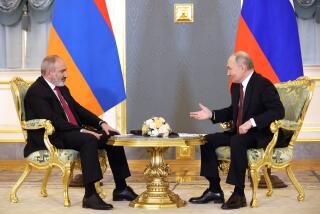Russia, U.S. Seek to Repair Rift Created by NATO Air Campaign
- Share via
MOSCOW — Sergei V. Stepashin, the latest of Russia’s revolving-door prime ministers, is trying to mend fences with the United States after the rift caused by NATO’s air war against Yugoslavia.
Stepashin arrived in Washington on Monday to begin the first top-level Russian visit to the U.S. since his predecessor, Yevgeny M. Primakov, turned his plane around over the Atlantic and canceled a trip to the U.S. capital in late March to protest NATO’s decision to attack Yugoslavia.
Russia’s relations with the U.S. reached a low point during the air war, and before departing Russia on Sunday, Stepashin warned that there was still hard work ahead to repair the damage. In a sign that both sides want to heal the rift, Stepashin is to meet with President Clinton and Vice President Al Gore today.
Russian pride was wounded when Moscow’s opposition to NATO’s campaign was ignored. In response, Russia suspended its relations with the North Atlantic Treaty Organization, but even at the most difficult moments, Russian leaders were careful not to push their protests too fa--they are desperate for International Monetary Fund credits needed to avoid a default on international debt.
Stepashin took over as Russian prime minister in May, when President Boris N. Yeltsin sacked the entire Russian Cabinet for the third time in less than 18 months. The baby-faced Stepashin was one of the main architects of Russia’s war against the separatist republic of Chechnya from 1994 to 1996.
Before departing Russia, Stepashin said the aim of this week’s talks is to restore political and economic ties and “get back to serious dialogue and serious work after a pause caused by the Yugoslav crisis.”
But strain between the nations has not been limited to the United States’ lead role in NATO’s 11-week bombardment of Yugoslavia, a campaign aimed at ending atrocities against ethnic Albanians in the Serbian province of Kosovo.
In recent “West 99” military exercises, Russian bombers skirted NATO airspace and the military simulated a nuclear attack on the West. Asked about this Sunday, Stepashin said Russian bombers were “simply flying while yours were bombing.” But he said that what was more important now was “not to go back, but to make headway.”
On Monday, that was also the message being promoted by Secretary of State Madeleine Albright and her Russian counterpart, Foreign Minister Igor S. Ivanov, who were in Singapore for the Assn. of Southeast Asian Nations regional security forum. They announced that they will install a second Washington-Moscow hotline to help avoid misunderstandings such as those that developed over Kosovo.
Stepashin said the relationship was strong enough to survive the damage caused by the war in Yugoslavia. “The reserve of strength in Russian-U.S. relations over past years prevented us from sliding into confrontation and put the settlement of the Kosovo crisis on a political footing, including working with the United States,” Stepashin said.
Stepashin, a Yeltsin loyalist who has denied having presidential ambitions, said this week’s trip will enable him to get to know U.S. leaders.
The thaw between Russia and NATO has already begun. Ivanov visited Britain last week, and Russian diplomats took part in a meeting of NATO’s permanent joint council in Brussels on Friday.
Stepashin said he planned to raise issues of arms control in Washington, including START II, a future START III deal and the Anti-Ballistic Missile Treaty.
There are a number of difficult issues: START II has not been ratified by Russia’s lower house of parliament, the Duma. And U.S. plans for a national antiballistic missile shield would need renegotiation of the ABM treaty.
One part of Stepashin’s mission is to lure back investors who were frightened off by Moscow’s financial meltdown in August. He said it seems that the West has a distorted view of what is really going on in Russia.
“It is important to give the Americans an objective picture of Russia and to explain which path our country is taking,” he said. While in Washington, the prime minister also is scheduled to meet with World Bank officials.
Moscow is awaiting an IMF board decision on a loan of $4.5 billion that would enable Russia to avoid the catastrophe of defaulting on its international debts.
Times wire services contributed to this report.
More to Read
Sign up for Essential California
The most important California stories and recommendations in your inbox every morning.
You may occasionally receive promotional content from the Los Angeles Times.













